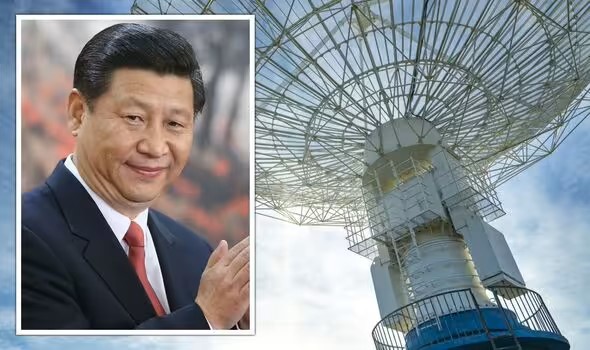China is planning the construction of a new radar base in Sri Lanka which will allow it to spy on UK and US military bases in the Indian Ocean.
The project, revealed by Sri Lankan intelligence sources, has been condemned by experts as proof of Beijing’s willingness to leverage the debts of its economic partners for strategic gain.
Planning for the remote satellite receiving ground station is being led by the Aerospace Information Research of the Chinese Academy of Sciences, and the base will be constructed in the dense jungles near Dondra Bay, at the island’s most southernmost tip in Ruhuna.
Its location would allow China to greatly increase its intelligence gathering operations against Western navy vessels in the Indian Ocean.
More seriously, it would allow China the potential to spy on US and British military installations in Diego Garcia, as well as India itself.
India’s spaceport in Sriharikota, its missile test range in Odisha, and several other military facilities in the peninsular region would all fall within tackling range.
Apart from signals intelligence, China’s ground stations form a key terrestrial leg of China’s overall space infrastructure, fulfilling the telemetry, tracking, and command capabilities that enable the operation of satellites and other spacecraft.
China’s orbital launch rate has risen dramatically over recent years, increasing China’s need for ground station support infrastructure.
The country conducted 19 orbital launches in 2015, but last year attempted 64 launches, sending more than 180 satellites into orbit.
This year the China Aerospace Science and Technology Corporation (CASC) plans more than 60 launches carrying over 200 spacecraft.
Sri Lanka is heavily indebted to China having become another victim of Beijing’s Belt and Road Initiative which provides infrastructure projects using Chinese labour at exorbitant rates to return.
Though the idea of constructing a new and unprofitable port in Hambantota came from Colombo the island nation, which boasts a population of only 22 million, now owes Beijing £6b – almost a tenth of its £71bn GDP, and a fifth of its total external public debt.
In view of its sharp economic crisis, China recently offered to freeze debt repayments for two years, while Sri Lanka brokered a deal with the IMF.
But Beijing’s magnanimity was not without strings, and one condition was said to be permission to build the radar base.
“Allowing China to build this base may well be part of the price for China allowing Sri Lanka to restructure its debt“ said Prof Alessio Patalano of KCL.
Sri Lanka is not the first example of Beijing leveraging debt for strategic gain, and the conditions imposed by Beijing are often so draconian that domestic governments are granted no oversight or even access into the duties actually performed by the radar bases.
The Chinese-built Espacio Lejano ground station in Neuquén, Argentina, has been shrouded in controversy since 2012, with the contract between both governments even stipulating that Buenos Aires “not interfere or interrupt” activities carried out at the station.
Espacio Lejano is run by China Satellite Launch and Tracking Control General (CLTC), a sub-entity of the PLASSF, which has heightened suspicion that the Chinese military makes ready use of the station.
CLTC manages the ground infrastructure for China’s space operations and is staffed by military personnel, further illustrating the integration of the military in space-related activities.
“China does its best to disguise the military nature of bases like these,” added Prof Patalano.
“But ultimately this is about information warfare: all shipping produces signals and intercepting these signals provides Beijing with vital intelligence.
“The worrying aspect here is not just that China knows how to leverage debt owed through BRI projects, but that national authorities who are confronted with the difficult realities of economic cooperation with China will do whatever it takes to free themselves.”
Source:express.co.uk


